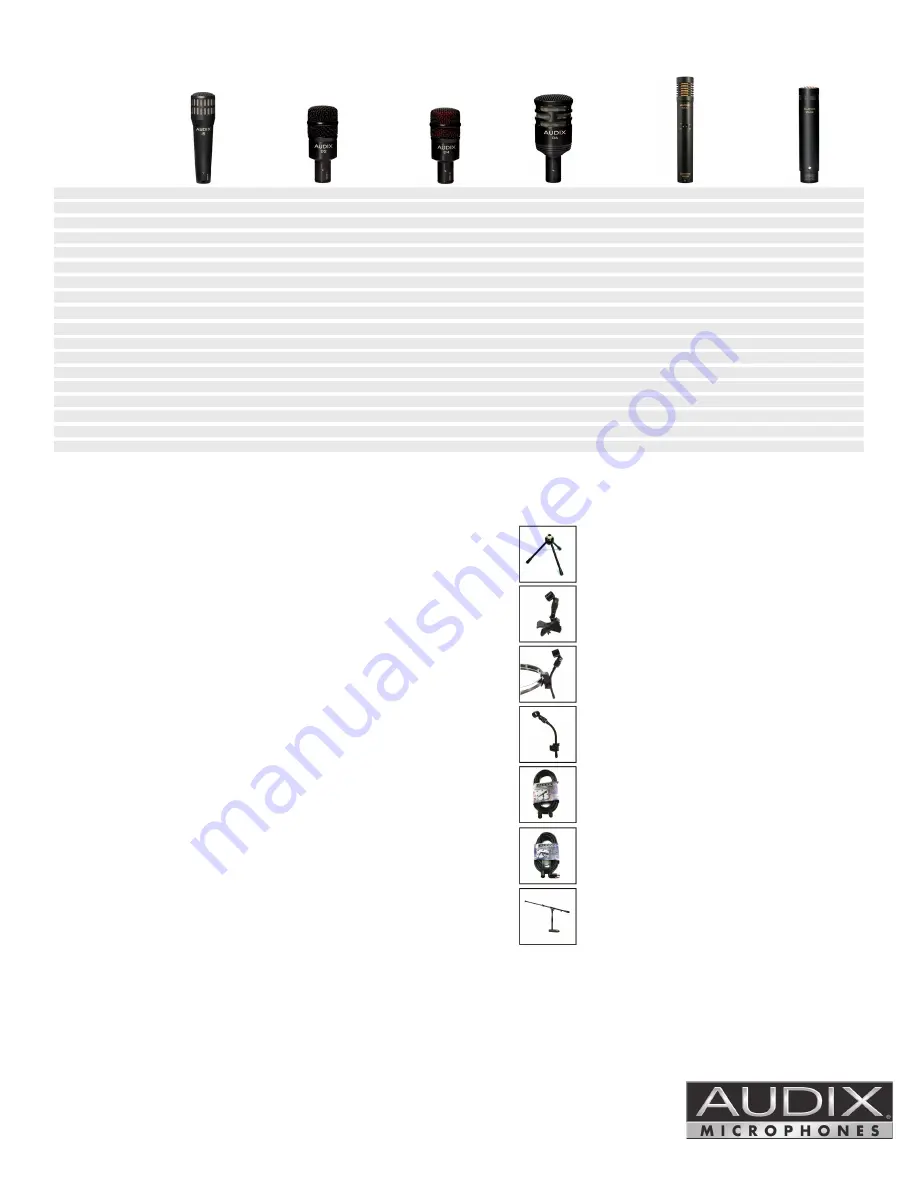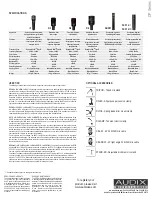
SPECIFICATIONS:
www.audixusa.com Call: 503-682-6933 Fax: 503-682-7114
Audix Corporation 9400 SW Barber Street, Wilsonville, OR 97070
SERVICE AND WARRANTY:
These microphones are under warranty
for a period of 3 years for condensers
and 5 years for dynamics from any and
all manufacturing defects. Should your
microphone fail in any way, please
contact the Audix service department at
503-682-6933. A Return Authorization
number is required before returning any
products
.
To register your
product, please visit
www.audixusa.com
CARE AND MAINTENANCE:
The DP Series Microphones are manufactured
to exacting specs with roadworthy construction.
However, the capsules are highly sensitive and
should be handled with care. Avoid extreme
temperatures and be sure to store your
microphone in the case provided when not
in use. Moisture of any kind can adversely
affect the sound and performance of your
microphone.
***All specifications subject to change without notice.
DP
Series
Application
Features
Transducer Type
Frequency Response
Polar Pattern
Output Impedance
Sensitivity @ 1k
Maximum SPL
Off-axis rejection
Power Requirements
Housing / Finish
Weight
Rack toms, floor
tom, conga
Slight mid-base boost,
excellent transient
response, big sound
Dynamic VLM
TM
Type B
44 Hz - 18 kHz
Hypercardioid
250 ohms
1.2 mV / Pa
≥144 dB
>30 dB
None
Machined Aluminum /
Black Hard Coat
128 g / 4.5 ounces
Floor tom, djembe,
cajon, tumba
Extended low end for
larger drums, accurate
frequency response,
natural sound
Dynamic VLM
TM
Type D
40 Hz - 18 kHz
Hypercardioid
200 ohms
1.4 mV / Pa
≥144 dB
>20 dB
None
Machined Aluminum /
Black Hard Coat
128 g / 4.5 ounces
Kick drum, floor tom,
djembe, cajon
Extended low end for
larger drums, accurate
frequency response,
natural sound
Dynamic VLM
TM
Type E
30 Hz - 15 kHz
Cardioid
200 ohms
0.8 mV / Pa
≥144 dB
>20 dB
None
Machined Aluminum /
Black Hard Coat
217 g / 7.7 ounces
Overheads, high-hat,
cymbals, goodie table
Accurate reproduction of
high frequency instruments,
-10 dB pad bass roll-off filter
Condenser
40 Hz - 18 kHz
Cardioid
100 ohms
18.5 mV / Pa
≥136 dB
>15 dB
9 - 52v phantom
Machined Brass /
Black E-Coat
184 g / 6.5 ounces
Overheads, high-hat,
acoustic instruments
Extremely sensitive and
highly accurate
sound reproduction
Condenser
40 Hz - 20 kHz
Cardioid / Hypercardioid
200 ohms
26 mV / Pa / 15 mV / pa
≥130 dB
>20 dB
48 - 52v phantom
Machined Brass /
Black E-Coat
114 g / 4 ounces
Snare (top or bottom), toms,
hand percussion, guitar cabs,
acoustic instruments
Protective steel grill, easy
to set up and use, clean,
accurate sound
Dynamic VLM
TM
Type B
50 Hz - 16 kHz
Cardioid
150 ohms
1.5 mV / Pa
≥140 dB
>23 dB
None
Die Cast Zinc Alloy /
Black E-Coat
183 g / 6.5 ounces
i5
D2
D4
D6
ADX51
SCX1-C /
SCX1-HC
TRIPOD - Tripod mic stand
DFLEX - All purpose percussion clamp
DVICE - Spring loaded rim mount clamp
DCLAMP - Tension rod mic clamp
CBL-20 - 20’ XLR-XLR mic cable
CBL-DR25 - 25’ right angle XLR-XLR mic cable
STAND-KD - Adjustable kick drum mic stand
OPTIONAL ACCESSORIES:
USER TIPS:
The following are some ideas as to how the microphones in the packs interact with each other.
DP4A
[1 x i5, 2 x D2s, 1 x D4]:
This package is ideal for a jazz set-up or a small combo kit or as general purpose
percussion mics for stage or recording. Note that you will need to acquire the DCLAMP or DFLEX in order to
attach the mics to hand percussion instruments. The D4, originally slated for kick drum and large toms before the
release of the D6, is excellent for small kick drums, particularly in the studio.
Snare and Toms:
As a general rule, the i-5 and D2 are meant to be close miked. A good starting point is 2 inches
above the rim with the mic pointing towards the center of the head. For more “rim” sound, pull the mic back closer
to the rim. For more resonance and depth of field, pull the mic further away from the head. The trick is to find the
right balance between resonance and attack while still controlling bleed from the other drums.
DP5A [1 x i5, 2 x D2s, 1 x D4, 1 x D6]:
This package is identical to the DP4A with the addition of the D6 kick drum
mic, allowing the D4 to be used on floor tom. To position the D6, a good starting point is a few inches inside the
port of the front head with the mic pointing off-center and not directly at the beater. For more attack, move the mic
closer towards the beater head. For more bass, pull the mic away from the beater head.
DP7 [1 x i5, 2 x D2s, 1 x D4, 1 x D6, 2 x ADX51]:
This package is identical to the DP5A with the addition of two
ADX51 condensers for overhead miking. With the addition of the overhead mics, you now have the opportunity
to create more depth of field and more presence within the mix. You have the choice of using both ADX51s for
overheads, or one for high hat and one for overhead.
Both as overheads: The most common positioning concept is to to keep the snare as the focal point and move
the mics into various left and right positions equal distance from the snare; 4 feet is a good starting point. For best
results, keep the mics in a vertical position, keeping in mind that you are not necessarily just miking the cymbals
but the whole kit. You will find after some experimentation that the kick, snare, and overheads will provide most of
your sound while the tom mics are used for sweetening.
One for high-hat, one for overhead: The ADX51 for high hat should be placed 2-3 inches above the top cymbal
and towards the outside edge. The overhead mic can be placed overhead above the cymbals, generally above
the rack toms. In the case where there are more cymbals on one side of the kit than the other, the mic can favor
the side with the most cymbals.
DP Elite 8
[1 x i5, 2 x D2s, 1 x D4, 1x D6, 2 x SCX1-C, 1 x SCX1-HC]:
This package is also identical to the DP5A
with the addition of three SCX series microphones. Included are two SCX1-C condensers for overheads and one
SCX1-HC for high-hat. The SCX series microphones are more sensitive than the ADX series, have a lower noise
floor and a wider sound field making them excellent for studio as well as live.
Overheads: The same concept applies as described above with the DP7. Again, the SCX1-C is extremely sensitive
so do not be afraid to pick up a majority of the sound through the overheads if the stage volume will allow it.
High-Hat: The SCX1-HC is also extremely sensitive so be sure the mic is up and away from the area where the
cymbals open and close, otherwise the mic will pick up wind noise and sound harsh. Careful positioning will isolate
the hi-hat from the rest of the kit and make it easier to feature it in the mix.




















